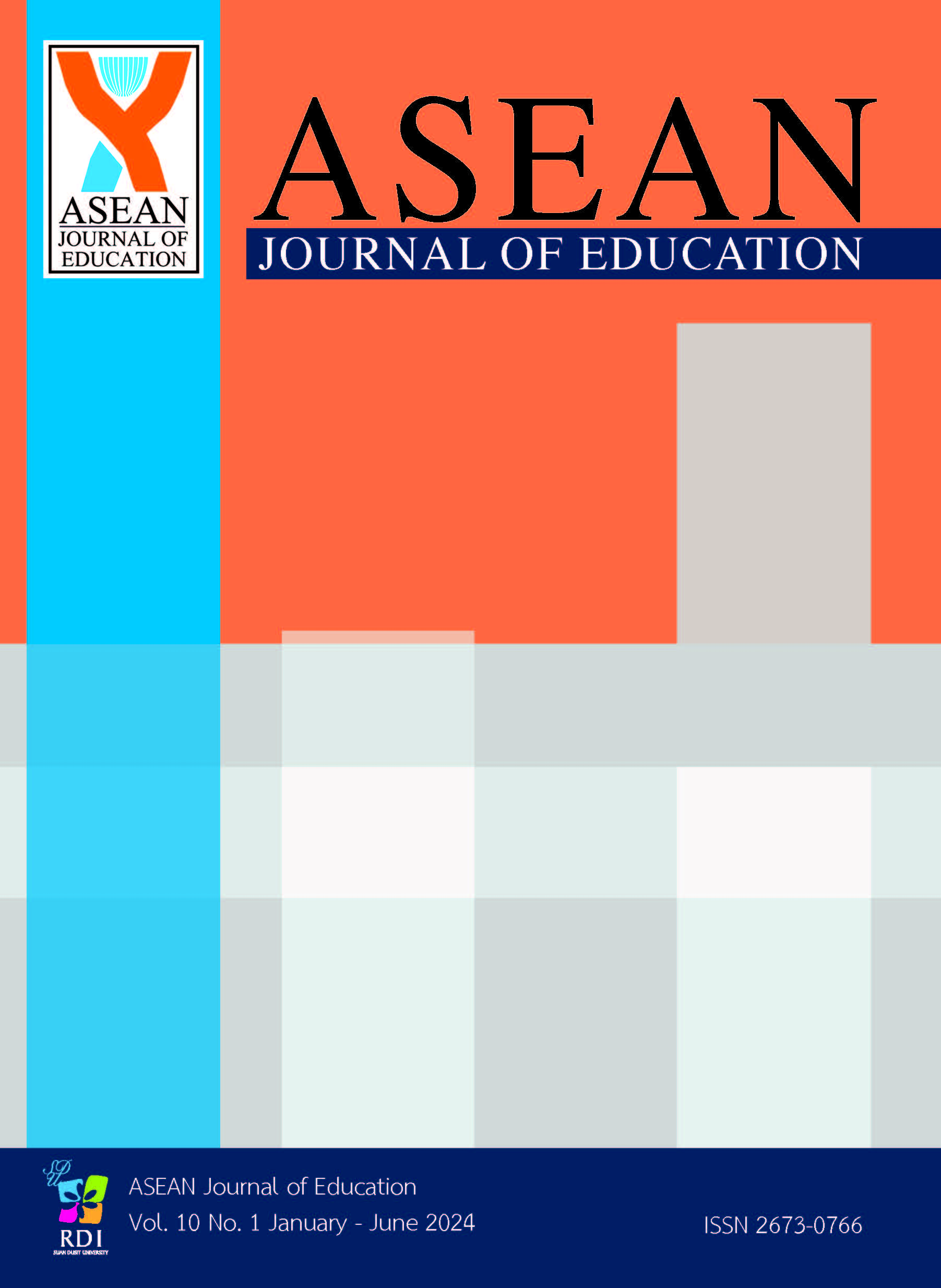Developing a Teaching Practicum Model for ‘Krurakthin’ Scholarship Recipients in the Bachelor of Education Program, Kalasin University
Keywords:
Developing a teaching practicum model, Krurakthin scholarship, Early childhood educationAbstract
This research aims to 1) investigate the current issues and challenges in the teaching practicum of early childhood education teachers and, 2) examine the components of the teaching practicum model for student teachers under the Teachers Return Home (henceforth Krurakthin) project at Kalasin University. The study targeted a group of 21 participants, including mentor teachers, school administrators, educational supervisors, representatives from destinations where schools were located, and faculty members specializing in early childhood education in the university network through purposive sampling. This research utilized focus group interview recording forms and an evaluation form to assess the appropriateness and feasibility of the training model. Data analysis involved calculating means, standard deviations, and content analysis. The research findings reveal challenges in the teaching practicum of early childhood education teachers within the Teachers Return Home (Krurakthin) project. Specifically, among student teachers, there are issues related to planning instructional activities, organizing experiences, classroom management, conducting classroom research, creating appropriate instructional materials, and assessing student outcomes. Mentor teachers exhibit a lack of understanding of their roles and inadequately demonstrate their responsibilities, coupled with a deficiency in collaborative efforts with instructional supervisors and educational institutions. School administrators lack a comprehensive understanding of their roles in guiding student teachers during their professional experience. In addition, instructional supervisors face challenges due to a lack of experience and skills in mentorship, and the execution of mentorship activities deviates from the planned guidelines. Some practicum schools chosen by students lack quality and fail to serve as exemplary institutions for student teachers. Furthermore, the teacher education institutions involved in the project exhibit inadequacies in their systems for supervising student teachers, with unclear assessment tools and criteria, and a deficiency in establishing understanding with the practicum schools. These identified challenges underscore the need for improvements in the overall structure and implementation of the teaching practicum model under the Krurakthin project. Additionally, the components of the training model for student teachers under the Teachers Return Home (Krurakthin) project at Kalasin University consist of five components: principles, objectives, operations, outcome assessment, and guidelines for successful implementation. The evaluation results indicated a high level of appropriateness (X̅=4.03, S.D.=0.68) and feasibility (X̅=4.02, S.D.=0.71) of the model.
References
Akyar, C. B. (2020). Investigating the mentoring of collaborative teachers and academic supervisors in pre-service early childhood education teachers’ teaching experience. Kastamonu Eğitim Dergisi, 28(2), 869–880.
Chamnisard, B. (2013). Developing a management model in early childhood education for schools under the jurisdiction of the primary education area office, Phetchaburi. Journal of Education Silapakorn University, 10(2), 134–146.
Cretu, D. M. (2021). Practicum in early childhood education: student teachers’ perspective. Revista Romaneasca Pentru Educatie Multidimensionala, 13(1), 261–278.
Equitable Education Fund. (2018). Equitable Education Fund Act B.E. 2018. Retrieved from https://www.eef.or.th/wp-content/uploads content/uploads/2019/07/EEF_Act.pdf
Equitable Education Fund. (2019). Protected School/ Standalone: Krurakthin Fund: Scholarship for students in remote areas to become new-generation teachers to develop the quality of community schools. Retrieved from https://www.eef.or.th/fund/teachereef
Equitable Education Fund. (2022). Homegrown Teacher Scholarship Program. Retrieved from https://en.eef.or.th/portfolio-items/homegrown-teacher-scholarshipprogram.
Faculty of Education and Educational Innovation, Kalasin University. (2019). Teaching Practicum Handbook in Schools 1-4. Faculty of Education and Educational Innovation: Kalasin University.
Faculty of Education and Educational Innovation. (2021). Curriculum for Educational Innovation Management (Revised Curriculum 2021). Faculty of Education and Educational Innovation: Kalasin University.
Friães, R., Lino, D., Parente, C., Craveiro, C., & Silva, B. (2018). The role of practicum for early childhood teacher education: the perspectives of student’s teachers. In ICERI2018 Proceedings of the 11th annual International Conference of Education, Research and Innovation (pp. 3352-3360). Seville: IATED https://doi.org/10.21125/iceri.2018.1746
Hemtasin, C., Payoungkiattikun, W., Pimsak, A., & Hongsa, N. (2023). Development of the extremely poor students selection process for receiving the teacher production project scholarship for protected schools in Thailand. Sustainability, 15(6), 5230.
Jacob, O. N., & Olajumoke, A. A. (2021). Supervisions of early childhood education program in Nigeria: Problems and suggestions. International Journal on Integrated Education, 4(6), 154–159.
Lathapipatlars, D., & Sondergaard, L. (2016). Thailand’s small school challenge and options for quality education. World Bank. Retrieved from https://blogs.worldbank.org/th/eastasiapacific/thailands-small-school-challenge-and-options-quality-education
Mykkänen, A., Kupila, P., & Pekkarinen, A. (2022). Impact of students’ prior work experiences on their perceptions of practicums as support for their professional development. European Early Childhood Education Research Journal, 30(5), 686–700.
Rochanasmita Arnold, S., & Roadrangka, W. (2004). New dimensions of teacher experiences. Journal of Kasetsart Educational Review, 19(2), 1–9.
Srisaart, B. (1992). Beginning research. Bangkok: Suwiyasarn.
Sondergaard, Lars M. (2015). Thailand-Wanted: a quality education for all (English). World Bank Group. Retrieved from http://documents.worldbank.org/curated/en/941121468113685895/Thailand-Wanteda-quality-education-for-all
Teachers' Council. (2019). Announcement regarding the details of knowledge and professional experience standards for teachers according to the teachers' council regulations on professional standards (Version 4) B.E. 2562. The government gazette, 137(special section 190d), 10–14.
Teachers' Council. (2020). Announcement regarding the accreditation of degrees according to professional standards, 4-year curriculum B.E. 2563. The government gazette, 137(special section 140 d), 13-15.
Woolston, D., & Dayman, T. (2022). Practicum-A space for leadership and mentoring. Teachers’ Work, 19(1), 29-45.
Downloads
Published
How to Cite
Issue
Section
License
Copyright (c) 2024 Suan Dusit University

This work is licensed under a Creative Commons Attribution-NonCommercial-NoDerivatives 4.0 International License.
1 All articles will undergo a formal peer-review. A panel of experts from within or without the university will examine the article; approval from a minimum of two experts is required for publication. Revisions posed by the experts must be completed by the research prior to publication.
2 Once published in the ASEAN Journal of Education, the article becomes intellectual property of Suan Dusit University. Duplication, in full or part, requires permission from Suan Dusit University.
3 Excluding errors incurred during printing, author(s) are responsible for the content of their articles.






